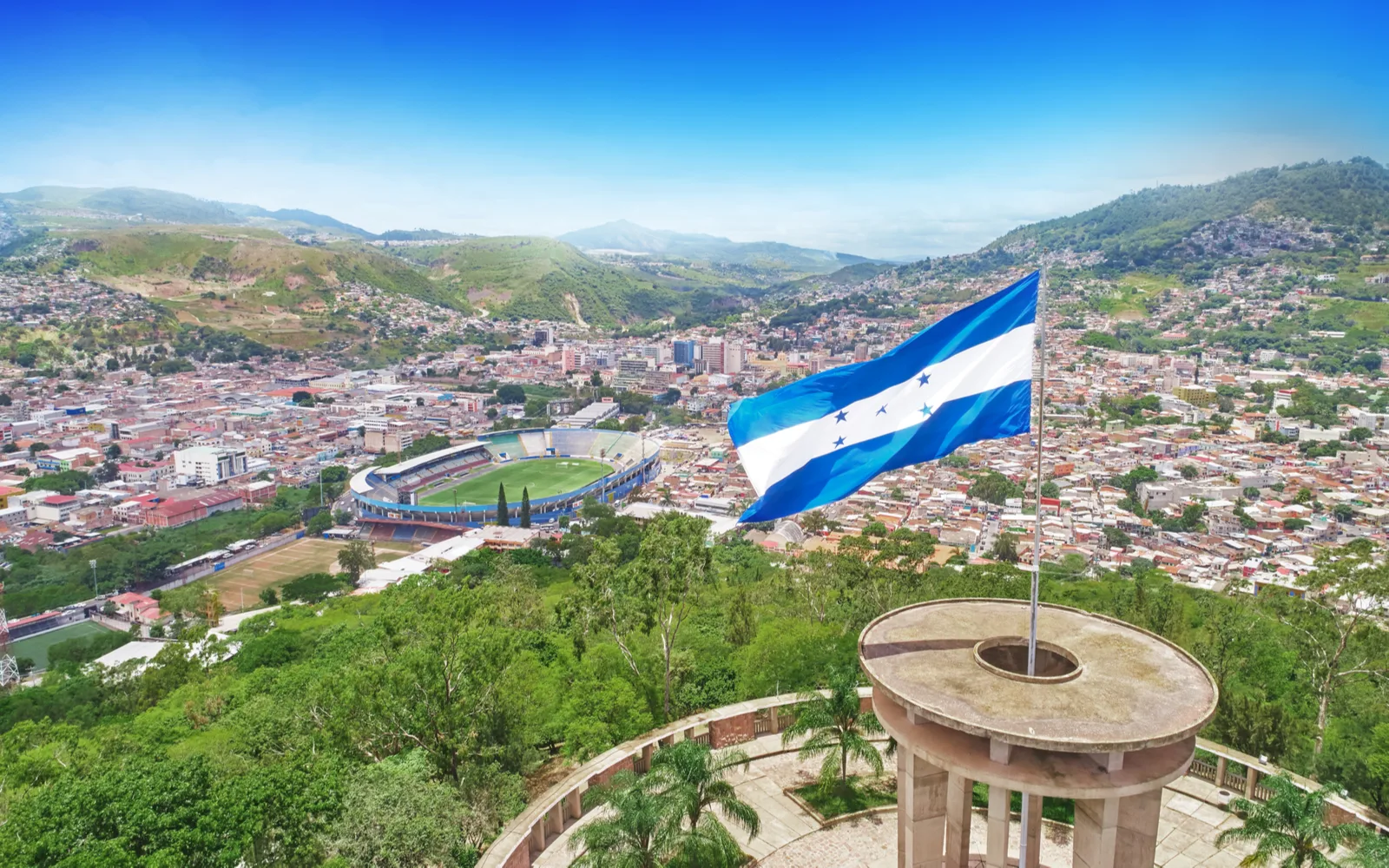Is Honduras safe to visit in 2026?
Honduras is the second-largest country in Central America, filled with tourist attractions. There are vast places to explore, like Caribbean beaches, bird-filled lakes, jungles, tropical rainforests, and the magnificent Bay Islands.
In 2021, Honduras registered 459,000 tourist arrivals, a significant increase from 204,000 tourist arrivals in 2020. It’s clear from the stat that the popularity of Honduras as a tourist attraction is on the rise.
However, numerous reports warn visitors of the risks associated with Honduras. So, is it safe to explore this Central American country?
Herein is a detailed analysis of whether Honduras is safe or not. Also included are tourists’ major safety concerns and tips on which areas to avoid and how to make your trip safe.
Is Honduras Safe to Visit?
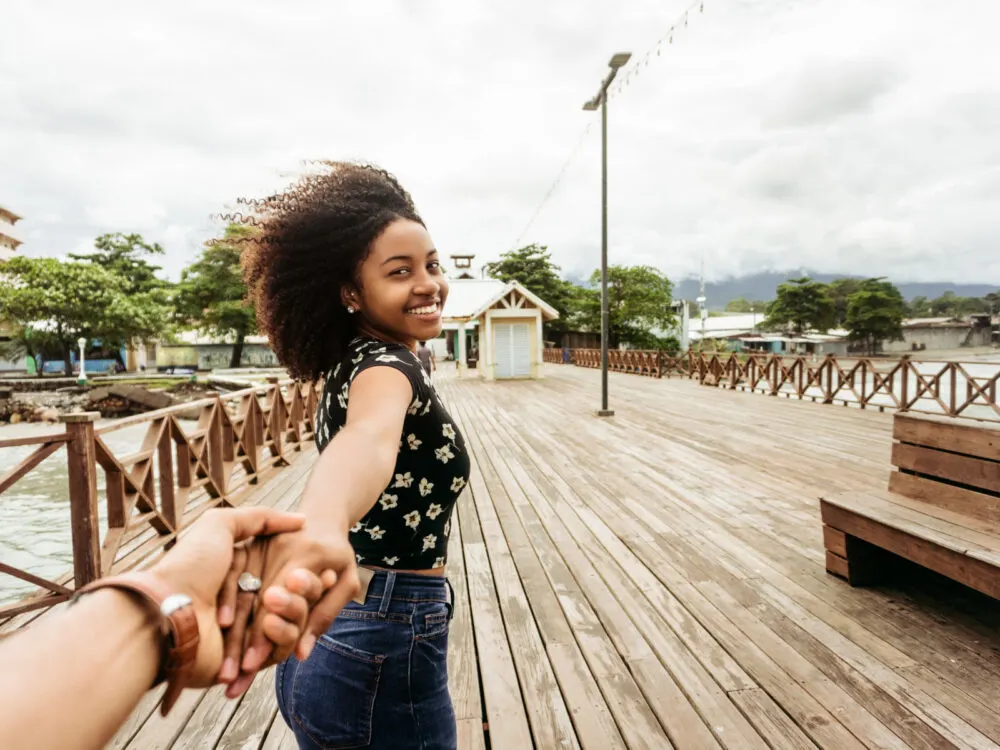
Djavan Rodriguez/Shutterstock
Honduras is safe to visit if you have a guided tour, but if you travel independently, you may face security challenges. Common safety concerns are petty theft and violent robbery, which can happen anytime.
Pickpocketing and bag snatching is prevalent on the streets, in airports, and outside hotels. Gangs also target vans traveling in deserted areas and ask tourists to hand over cash and valuables.
Violent crime is as rampant as petty theft, with tourists falling victim to assault, kidnapping, rape, and murder. Apart from these crimes, there are other safety concerns in Honduras, such as:
- Natural disasters like earthquakes and slides
- Accidents caused by poor road conditions
- Injury during demonstrations
- Credit card and ATM fraud
- Spiked food and drinks
- Scams
Crime in Honduras
Honduras has a high homicide rate, with a murder rate of 36 people per 100,000 in 2020. Murders are easy to commit because most of Honduras’ population is armed.
According to the International Rescue Committee, femicides are a major concern in Honduras. A woman is likely to be killed every 36 hours in this country. Though the crime rate has plummeted in the last few years, it’s still of significant concern.
Street gangs continue with theft, violent robbery, sexual assault, and murder. Gangs actively participate in drug trafficking, sometimes kidnapping wealthy residents and asking for ransom.
Although kidnappers target the rich, tourists may also fall victim. The Honduras Government lacks enough resources to investigate and prosecute criminals, which makes the criminals operate without fear.
Put the following tips into effect to avoid falling victim to the above crimes:
- Always be aware of your surroundings.
- Be cautious with strangers. Don’t accept free rides.
- Don’t walk alone after dark and in deserted places.
- Don’t resist robbers. Give them what they want.
- Don’t flash valuables such as jewelry and electronics in public.
Avoiding Bad Neighborhoods
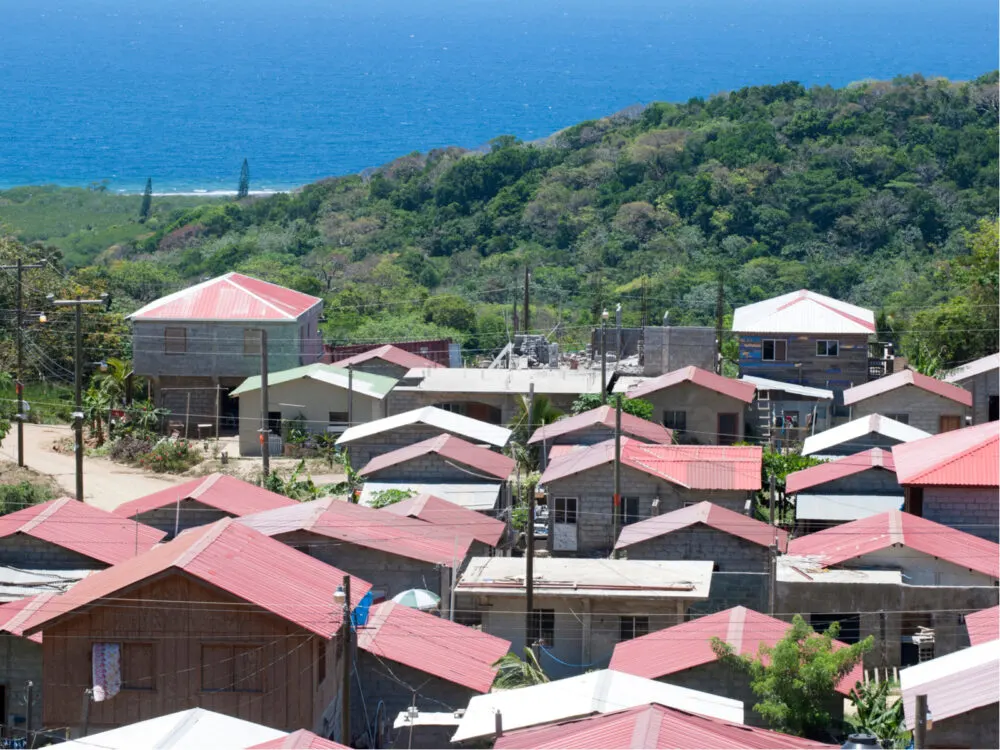
Ramunas Bruzas/Shutterstock
The north and central parts of Honduras have the highest crime rates. San Pedro Sula and Tegucigalpa are neighborhoods with the most gang activity.
The areas are also under extreme poverty, so you must watch your belongings. These two neighborhoods are home to Barrio 18 and Mara Salvatrucha (MS13) gangs that control residents’ lives.
Apart from robbery and assault, they extort money, which they call war tax, and any defaulter suffers consequences. Most families in the mentioned areas have at least a family member who is part of a neighborhood gang.
Other neighborhoods to avoid include:
- Gracias Adios. Famous for drug trafficking, extortion, narcotics, and human trafficking. Police don’t respond adequately to crime.
- Choloma, Cofradia, and Chamelecon. These places have very high murder rates committed by criminal gangs.
Avoid these neighborhoods at all costs. If you must go, watch your belongings and be vigilant to avoid provoking anyone’s attention.
When visiting Roatan, get a guide and avoid driving alone on remote roads like Palm Beach Road. Other roads to avoid, especially at night, include:
- Limones to La Union
- La Esperanza to Gracias
- Olancha through Salama to Saba
- Gualaco to San Esteban
- Santa Barbara roads
- Roads in Tela, El Progreso, Trujillo, and La Ceiba
Bay Islands is safe, although a few attacks might occur on the ferries. Other safe places include Utila islands, la Ceiba on the northern coast, and Copan, an ancient archaeological site.
Public Buses and Taxis
Armed robbery happens day and night in public buses and taxis. These attacks target tourists because they may have cash and valuables with them. Public buses, also known as “colectivos,” are the most dangerous to ride.
They are former school buses that you can spot by their yellow color. Young gang members working in pairs often pretend to be riding a motorcycle and then suddenly order a bus driver to pull over.
They then use guns and knives to scare the bus occupants to submission. It’s also best to avoid boat travel because private vessels are robbery targets. Criminals pretend to be fishermen and pounce on unsuspecting tourists.
You can boost your safety by doing the following:
- Roll up windows to avoid robberies at traffic lights.
- Travel first class in buses, using a reputable company.
- Travel in “radio cabs,” which are radio-monitored.
- Don’t agree to travel with unknown people in taxis.
- Avoid traveling at night, even when in a group.
- Don’t discuss your travel plans in public. Thugs might follow you.
Demonstrations
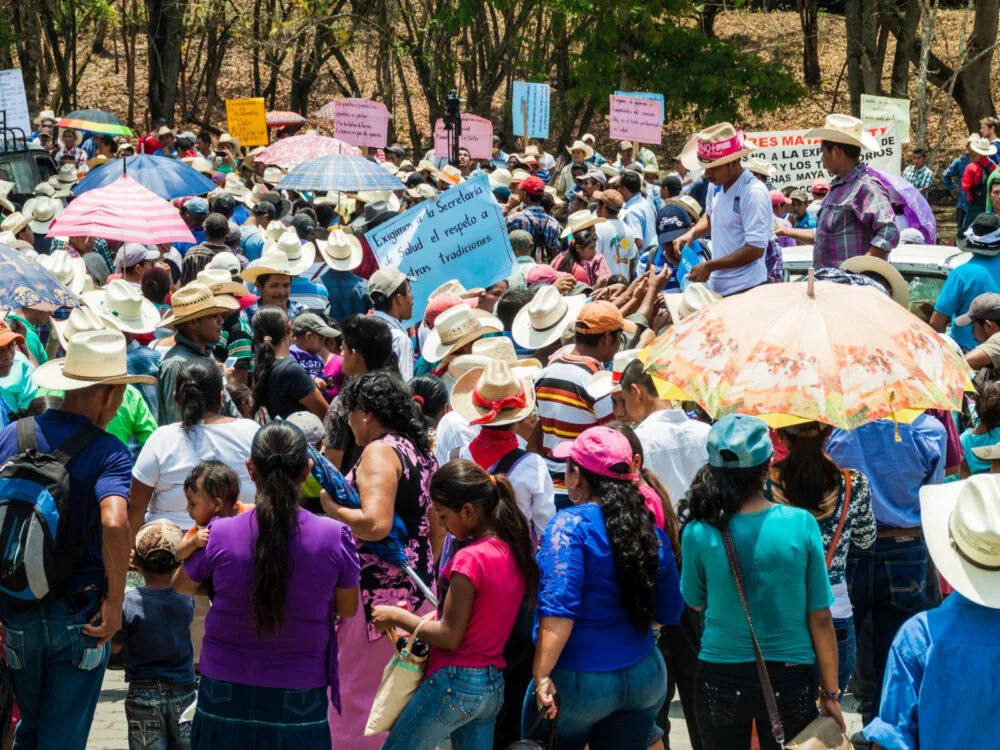
COPAN RUINAS, HONDURAS – APRIL 12, 2016: Indigenous people protest against minery near the archaeological park Copan, Honduras/Matyas Rehak/Shutterstock
In Honduras, demonstrations can happen suddenly. Even though they start peacefully, the chances of violence happening are high. Protests happen mainly in La Ceiba, San Pedro Sula, and Tegucigalpa.
Protests often lead to roadblocks at short notice, disrupting your travel. Don’t try to go through blockades even if you’re late. You may be robbed in the process or suffer injuries because protestors throw petrol bombs.
Police are also notorious for using live ammunition to disperse crowds. Be aware that the government prohibits foreigners from political activities and discussions. You could be detained or deported.
Adhere to the following tips to avoid being caught up in demonstrations.
- Avoid large public gatherings. Violence could erupt any minute.
- Follow local news to be aware of ongoing demonstrations.
- Always have a full tank in case you need to escape if a riot breaks out.
- Follow local authorities’ instructions. If they say stay indoors, do it.
Roads
There is little order on some Honduran roads. Some roads are poorly lit and poorly marked. Traffic signs are inadequate, and animals wander in the streets.
The road from Tegucigalpa to La Ceiba has risky mountain curves while El Progresso to La Ceiba has poor bridges and animal crossing. The risk of crashing into animals is high.
If you are traveling from the south coast to the north, pass through Tela to La Ceiba and then Trujilo (CA-5 to route21 to CA-13). Besides poor road conditions, drivers of public buses drive recklessly.
Some are underage, driving without a license. To be safe, use a bus from a reputable company. The following tips will help you stay safe on Honduras roads:
- Ask locals for the best routes. They know the streets better.
- Don’t drive at night.
- Don’t use public buses (colectivos) to travel.
Natural Disasters
Honduras is susceptible to earthquakes, flooding, and hurricanes. Rockslides, mudslides, and flooding happen during the rainy season from May to October, which causes the closing down of major roads.
In June, the possibility of a hurricane is high. Traveling during the dry season (November to April) is better. In 2018, an earthquake measuring 7.3 struck Honduras. Although earthquakes happen frequently, this was the strongest in three decades.
Other quakes struck later but with lower magnitude, killing seven and injuring 40. To avoid falling victim to natural disasters, avoid exploring flood-prone areas and follow instructions given by local authorities.
Scams
Criminals will often use scams to rob you. If you aren’t cautious, you may fall for their tricks. Organized fraud networks carry out these scams, improving their skills daily.
Apart from pretending to be police officers or needy people on the roadside, the scammers research extensively to create credible-looking documents and fake business profiles.
They illegally use logos and names of reputable companies, and their websites look convincing. Someone might even approach you, claiming to work for the embassy and saying they can help you in any way.
Here’s how to avoid scams:
- Don’t stop to help a person seeking help at the roadside. They are probably part of a gang waiting to pounce on you. They may use a child to trick you.
- Some gang members pretend to be police officers and stop vehicles for police checks only to rob you. If you’re suspicious, don’t stop.
- Inform your family back home that if they receive a message saying you need money, they should confirm with you first.
- Contact the embassy to find out if someone works there as they claim.
Spiked Food and Drinks
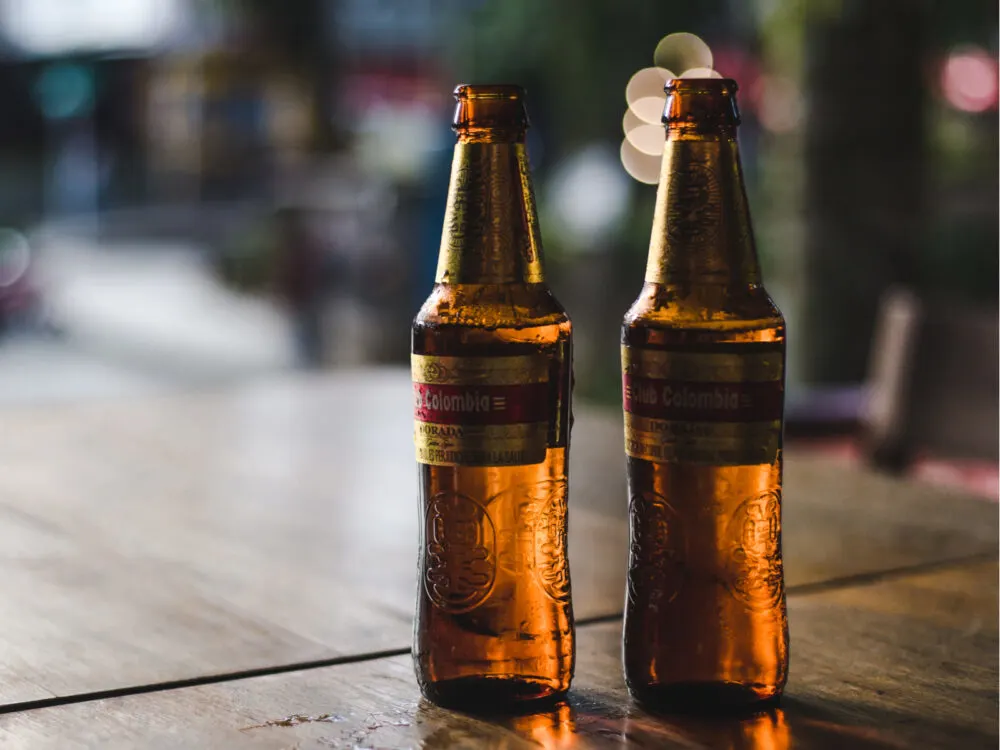
Lauren Squire/Shutterstock
It’s easy to have your drinks spiked with drugs in Honduras. The result could be theft of your cash and items or sexual assault. Drugs used to spike drinks come in powder or tablets.
When dissolved, they are odorless and colorless, making it difficult to know whether it’s spiked. The symptoms after consuming a spiked drink are almost similar to being drunk.
If you feel confused, have hallucinations, or have difficulty concentrating, call for help immediately before the drug takes effect and the perpetrator has their way with you.
Follow the tips below to avoid being a victim of spiked drinks:
- Don’t accept snacks, cigarettes, and beverages from strangers.
- Don’t leave your food or drink unattended, even for a moment.
- Go to the bar with a friend so you can watch over each other.
- Watch for any changes to your drink, like slight fizzing.
Health Safety
Insect-borne diseases like malaria and Dengue fever are prevalent in Honduras. In 2019, 112,700 Hondurans contracted Dengue fever, and 266 died. It was the worst outbreak in their history.
Other diseases present are Yellow Fever, Zika Virus, Typhoid, and Hepatitis A. Mountain leprosy is also a threat. It’s contracted by swimming in water contaminated by animal urine.
The answer is no if you are wondering whether you can drink tap water in Honduras. That includes eating fruit washed with tap water or consuming ice cubes made from tap water.
To avoid the possibility of contracting disease, follow these tips:
- Carry mosquito repellent to protect you from mosquito bites.
- Get the necessary vaccines before traveling.
- Avoid contact with dirty water to prevent Mountain Leprosy.
- Wear a face mask during dry seasons if the air is dusty.
- Drink bottled water or boil yours at the hostel.
- Wash your hands often.
ATM Fraud
Be careful when using credit/debit cards in Honduras. Standalone ATMs are an easy target for fraudsters. ATM skimming is common in Utila, where fraudsters clone your card and withdraw your cash.
- Use ATMs only in banks, hotels, and shopping centers.
- Don’t withdraw a lot of money at once.
- Don’t use a card reader with unusual features.
- Check your account for unauthorized transactions.
- Pay attention to how your cards are handled.
- Don’t let people behind you see your PIN.
- Change your PIN after withdrawal if you sense danger.
- Establish a separate travel account to avoid losing all your money.
Things to Consider
Even with all the safety concerns, people continue traveling to Honduras. Here are tips to put to use when traveling to this country.
- When lost or scared, act confident. The last thing you want in your visit is to attract attention and be a crime target.
- Carry a fake wallet with some cash. In case you’re robbed, you can hand that out.
- Don’t bring a nice phone. Carry an older phone you don’t mind losing.
- Don’t attract attention. Dress casually like the locals, especially if you’re female.
- Carry photocopies of documents. You don’t want to experience delays because your travel documents were lost in a robbery.
- Don’t walk on beaches at night. Also, avoid camping at night because it’s easier to be spotted with the camp’s fire burning.
Frequently Asked Questions
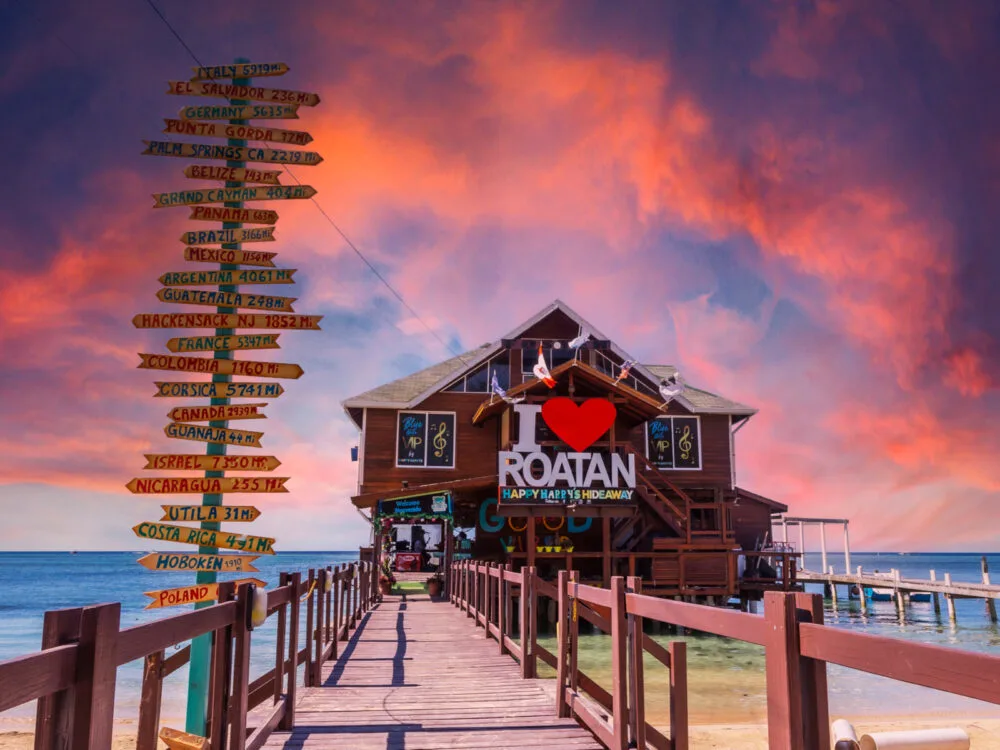
Unai Huizi Photography/Shutterstock
Here are some frequently asked questions regarding safety in Honduras.
Is it safe to visit Honduras in 2022?
It’s not entirely safe to visit Honduras in 2022. Your stay may be without incidences if you keep off dangerous neighborhoods, are aware of your surroundings, and maintain a low profile.
What parts of Honduras are safe?
Bay Islands is the safest place in Honduras. Other secure areas include Utila islands, la Ceiba on the northern coast, and Copan. You can add extra security by having a guided tour.
Do tourists get kidnapped in Honduras?
Cases have been reported of gangs kidnapping tourists and extorting money from their relatives.
Is Honduras worth visiting?
Honduras is worth visiting as a group. The Caribbean beaches, bird-filled lakes, jungles, tropical rainforests, and the magnificent Bay Islands are worth visiting as long as you stick to neighborhoods with few crime incidences.
Is Tegucigalpa safe?
Tegucigalpa and San Pedro Pula are two of the most crime-infested neighborhoods. They aren’t safe and unless you have to be there for other reasons, avoid these two places at all costs.
So, Is Honduras a Safe Place to Go?
Honduras isn’t 100% safe, but you can travel there as part of a group taking a guided tour. If you’re traveling independently, you may face security challenges. Traveling here may be risky, but it’s not impossible.
Areas like Bay Islands, Utila islands, La Ceiba on the northern coast and Copan are safer than Tegucigalpa and San Pedro Pula. The most common safety concerns are petty theft and violent robbery, which can happen anytime.
Avoid traveling at night or alone, keep a low profile by not being flashy, and stick to safe neighborhoods. When you do this, you lessen the chances of robbery or assault. Safe travels!



